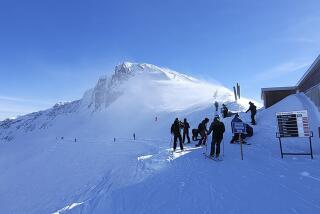A Tahoe snowboarder was ‘buried alive’ on the slopes. Lawsuit says the resort is to blame

- Share via
In late February 2023, a major blizzard dumped several feet of fresh powder across Northern California’s mountains — dream conditions for many experienced snowboarders like Wesley Whalen.
Instead, it turned into the worst-case scenario.
Whalen, 46, suffocated to death underneath the deep snow at Heavenly Mountain Resort in Tahoe on March 1, 2023.
His widow says the resort is to blame.
In a recent lawsuit, Chanel Whalen claims that Heavenly made the extreme conditions even more dangerous and failed to warn visitors or increase safety patrols, causing her husband’s death, which the complaint called an “unnecessary and preventable tragedy.”

The lawsuit, filed last month in El Dorado County’s Superior Court and first reported by the San Francisco Chronicle, claims that Heavenly increased the risk of sinking into the loose, deep snow by triggering an avalanche not long after the blizzard. The suit alleges that “blasting” the snow to spur controlled avalanches — a regular practice at ski resorts — not only increased the amount of powder, but also hid the natural signs of a loose snowpack by creating the appearance of a solid top layer of snow.
“Combining this freshly loosened powder with the practically unheard of levels of precipitation created a significant increased risk of cave-in,” the lawsuit said. “Heavenly further failed to warn guests that they had blasted, meaning that even skilled and experienced skiers and snowboarders would have no reason to believe the sink risk was as high as it actually was.”
The wrongful death lawsuit claims the resort was negligent and demands unspecified damages.
Ashlee Lamber, a spokesperson for Vail Resorts, Inc., which owns and operates Heavenly, declined to comment on the case, saying that the company doesn’t comment on pending litigation.
On the day he died, Whalen — who was described in the complaint as a “skilled and experienced snowboarder” and active in the U.S. Deaf Ski and Snowboard Assn. — was going down a single black diamond trail when he pulled over to the side to stop, the lawsuit said. The attorney representing Whalen detailed what occurred after reviewing footage from a GoPro-style video camera Whalen had on him.
“He started to slowly, but consistently sink into the snowpack” with “snow collapsing on top of him,” the lawsuit said. “Wesley was buried alive.”
The lawsuit called the snow that day “deceptively loose” and also said that there was “insufficient ski patrol coverage.”
Malachi Luis Garcia survived two nights in the freezing San Gabriel Mountains after losing track of his friends while snowboarding at Mountain High Resort.
The complaint noted that some reports after his death indicated that Whalen fell into a “tree well,” a dangerous dip in deep snow that is known to trap skiers and snowboarders. But the lawsuit said “there were no warnings anywhere about the dangers of tree wells and cave-ins” and the resort should have installed temporary fencing and warning signs, if such dangers were present.
The National Ski Areas Assn. warns that skiing off groomed trails increases the risk of having a deep snow or tree well accident, which can be deadly. But the suit claims that where Whalen pulled over was “well within the open trail,” and how he died is not part of the inherent risks associated with snowboarding.
“Being swallowed by snow as if sinking in quicksand is not intrinsic in snowboarding,” the lawsuit said.
“Wes was a leader in the deaf community and his wife, Chanel, was his entire world,” Mike Guasco, the attorney representing his wife, said in a statement. “His death is an immeasurable loss, one which the community and Chanel still feel acutely. Worse, his death was entirely preventable.”
More to Read
Sign up for Essential California
The most important California stories and recommendations in your inbox every morning.
You may occasionally receive promotional content from the Los Angeles Times.












